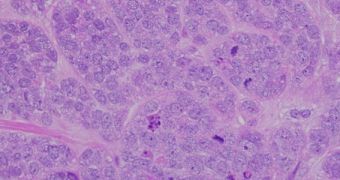According to the conclusions of a new study by researchers at the Columbia University Medical Center (CUMC), it would appear that administering a single, moderate-intensity radiation dose to a breast unaffected by breast cancer could significantly impair the emergence of tumors from that breast.
This result is important because 15 percent of women who are cured of cancer in one breast tend to have the disease relapse shortly afterwards in the other one. Preventing this from happening could therefore improve cancer survivability and patients' quality of life for years, Science Blog reports.
In a paper published in the December 20 online issue of the open-access journal PLOS ONE, the CUMC team says that the new research was carried out on mice. However, similar approaches may prove beneficial to humans as well, says the director of the Center for Radiological Research at the CUMC, David J. Brenner, PhD.
The expert says that prophylactic mammary irradiation (PMI) can strike a balance between killing premalignant cells in the other breast and producing these cells. Future mouse studies will look at the effectiveness of PMI on BRACA1 or BRACA2 mutations, which are well known for their potential to cause aggressive breast cancers.

 14 DAY TRIAL //
14 DAY TRIAL //